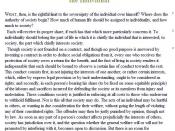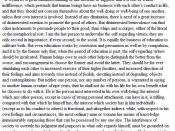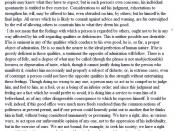John Stuart Mill
On Liberty
Chapter IV: Of the Limits to the Authority of Society over the Individual
OBJECTIVE PART
J.S. Mill, in his extended essay On Liberty, more specifically in Chapter 4, discusses the appropriate level of authority that society should have over the individual. He starts by rejecting the idea of social contract previously founded by Jean-Jacques Rousseau, Thomas Hobbes and John Locke, yet acknowledges "the rights and duties" concept by stating that "Though society is not founded on a contract, [â¦]every one who receives the protection of society owes a return for the benefit [â¦] In each person's bearing his share (to be fixed on some equitable principle) of the labours and sacrifices incurred for defending the society or its members from injury and molestation. These conditions society is justified in enforcing at all costs to those who endeavour to withhold fulfilment." (parag 3)
Mill also offers a distinction between punishment by law and punishment by opinion.
He admits that some acts are hurtful to others, but not to an extent as to justify government intervention. In these cases, public opinion may be punishment enough: "The acts of an individual may be hurtful to others, or wanting in due consideration for their welfare, without going the length of violating any of their constituted rights. The offender may then be justly punished by opinion, though not by law. (parag 3)
Mill then clarifies that he believes in the virtues of goodwill and in personal intervention on behalf of others. What he opposes is just governmental efforts to require such behaviour from people. He encourages individuals to take a "free" initiative to help others to get back on the right track: "It would be well, indeed, if this good office were much more freely rendered than the common...


